
January always brings about a desire or search for change, so now is the perfect time to examine whether the way you operate as a landlord is entirely good for you. There is a lot to manage, a lot to remember and a lot to stay on top of, even with just one property (let alone a larger portfolio).
We speak to more and more landlords who find it quite a task to keep abreast of the ever-increasing legislation while also keeping to their regular responsibilities of looking after their rental property and tenants. But we also meet landlords who are doing more than they need to, leaving them less time for enjoying life. So, for the start of 2021, here are five new year’s resolutions to make your life as a landlord easier, more organised and more fun.
I WILL DO MY TAX RETURN EARLY
There is nobody, but nobody, who lists filing their tax return as one of their favourite hobbies, but tax is one of life’s inescapable obligations. As with any task, leaving it until the last minute – like 11:45pm on January 31st – means it will nag at you for longer, but having it done in good time will leave you feeling more relaxed, professional and accomplished.
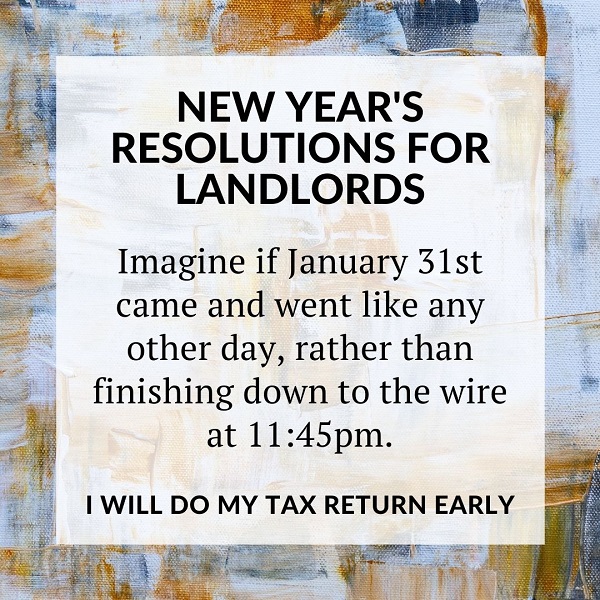
One of the barriers for people is the thought of sitting for hours on the Self-Assessment website, so instead of setting yourself up for a marathon session, break the job down into smaller tasks. You can complete your return in stages, so perhaps setting aside an hour each Sunday before lunch might work, with the reward of a scrumptious roast providing ample motivation.
Before you log on, start by creating a complete expenditure list, from maintenance and repairs to mortgage payments, insurance premiums, service charges, ground rent, agent’s fees and any other costs for the financial year. Next, move on to income from your rental property and other sources, including businesses, work, investments, savings, pensions, etc.
Once you’ve collated all the money in and money out, you can begin completing your tax return on the Government’s website. Imagine if January 31st came and went like any other day, instead of arriving with a sense of doom and finishing down to the wire.
I WILL SET REMINDERS
Passive income is an appealing part of being a landlord, but there are times in the year when you’ll need to be active. That said, you can minimise the brainspace required by setting reminders in your calendar for important dates.
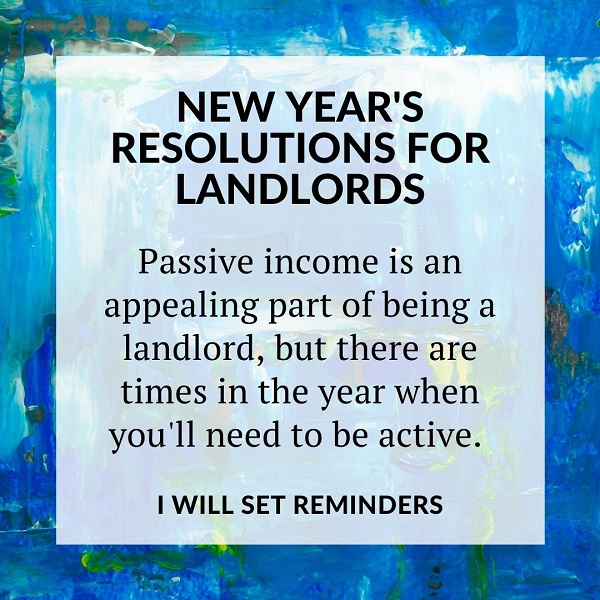
If your property has gas, you’ll need to arrange a Gas Safety Check and Certificate every year, so that’s a recurring appointment that can go into your calendar right away. Set it in your smartphone now, and it’ll remind you forever.
Insurance policies also come up for renewal each year, so it’s worth setting those dates as well. More than ensuring that payment is made, you’ll have the opportunity to shop around for more competitive quotes, rather than just renewing your current policy through lack of time.
Energy Performance Certificates (EPCs) and Electrical Installation Condition Reports (EICRs) are both legal requirements and both valid for 10 years, so check the date of your last one and put a reminder in your calendar for a couple of months before the expiry date. Other dates for your diary may include appliances on regular maintenance contracts, periodic redecoration, or half-yearly inspections of your property.
By setting these items and reminders in your calendar now, you’ll remove the need to keep them in your head and be able to deal with them in good time, rather than get caught by surprise. Or late!
I WILL BUILD AN EMERGENCY FUND
You can’t predict when the unexpected will happen, but you can prepare for it. No one wants the dreaded call from their tenant saying the boiler has broken down, the washing machine has finally died, or the drains are blocked, but it’ll be worse if you don’t have the money to fix it.
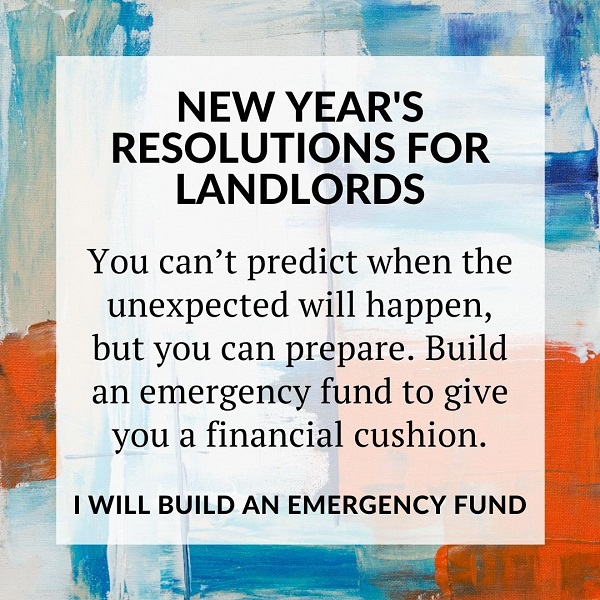
By setting up an emergency fund, you can safeguard yourself in the event of sudden problems. Aiming to save 10% of each month’s rent is a good number to work to and will give you a cushion against unexpected expenditure, as well as vacant periods.
Getting on top of your rental finances and putting something aside for emergencies can stop you running into financial trouble. Otherwise, you might be left taking out a loan to cover the costs, or getting repairs done on the cheap, only for the problem to rear its head again. You could also take out emergency insurance cover, but make sure to check for what’s included: appliances often aren’t and extras can add up.
I WILL ACT LIKE A BUSINESS
Being a landlord is most definitely running a business, so if you haven’t done so already, embrace a professional mindset.
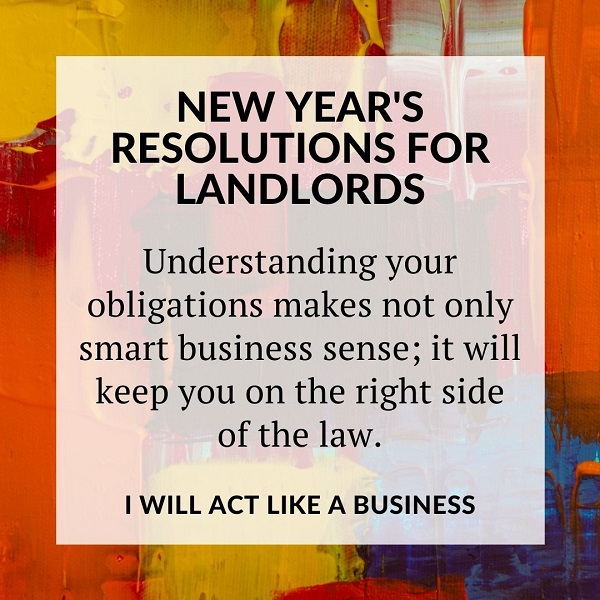
Start by making sure you’re clued up on the latest legislation. From up-to-date Right to Rent checks to new EPC rules requiring a rating of E or above, there is plenty you need to know. In fact, there are more than 150 pieces of legislation relevant to the rental market and understanding your obligations makes not only smart business sense, it will keep you on the right side of the law.
Of course, being in-the-know about legislation isn’t the only way to treat your rental property as a business; service also has a major role to play. Always respond quickly when your tenants contact you, whether it’s a minor issue or major repairs. Everybody accepts that some things can’t be fixed immediately, but the simple act of responding shows a responsibility towards your property and tenants.
It’s also important to make inspections of your property during the tenancy, at least once every six months. As well as building trust and maintaining a good landlord-tenant relationship, your visit might identify a potential problem that had so far gone unspotted: it’s always easier to notice more around a property when you haven’t seen it for a while, than when you see it every day. A high level of service and a good relationship helps to keep your tenants happier and to stay in your property for longer, resulting in fewer void periods and better yields.
I WILL REDUCE MY BURDENS
While it’s important to get everything in order with your rental business, we still recommended going easy on yourself. Some landlords have buy-to-let portfolios; others have a single property they manage alongside their primary job. Either way, the business of being a landlord can be time-consuming and can interfere with doing the things you love.
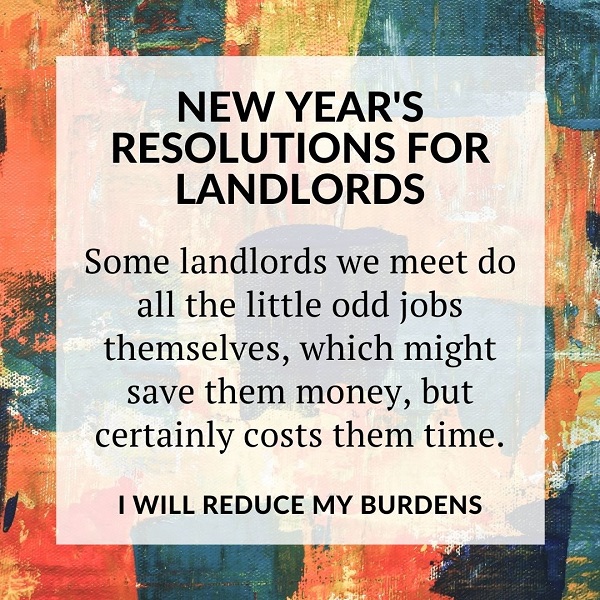
Some landlords we meet do all the little odd jobs themselves, which might save them money, but certainly costs them time. This can be down to their mistrust of contractors or an unwillingness to spend, but very often they appear quite hassled.
Using a managing agent is one way to get your time back, whether you’ve got a portfolio of one, ten or more. They will organise your compliance obligations, stay on top of legislation, attend to tenant issues, carry out inspections and make sure your rental property is run like a business on your behalf. They’ll also have local and trusted contractors to call when things go wrong to make sure that repairs are done swiftly and correctly: if a contractor wants to keep getting the business for a managing agent’s properties, they absolutely need to be reliable.
Having all of this handled leaves you free to focus on the things in life that really matter, like spending time with family and friends. And all the while enjoying a passive income from your property without the need to worry about every – or any – little thing.
In summary
As Benjamin Franklin said: “by failing to prepare you are preparing to fail”, so getting your landlord year off to an organised start is a wise move indeed. Then you can spend the rest of 2021 knowing that your rental business is running like a well-oiled machine.
If you have a rental property in the Salisbury or Wilton area and you’d like to find out whether a managing agent is right for you, why not get in touch? Call us for a chat on 01722 5800598 or email us at info@piccoloproperty.co.uk - we’d love to show you how we can help you make the most of being a landlord.




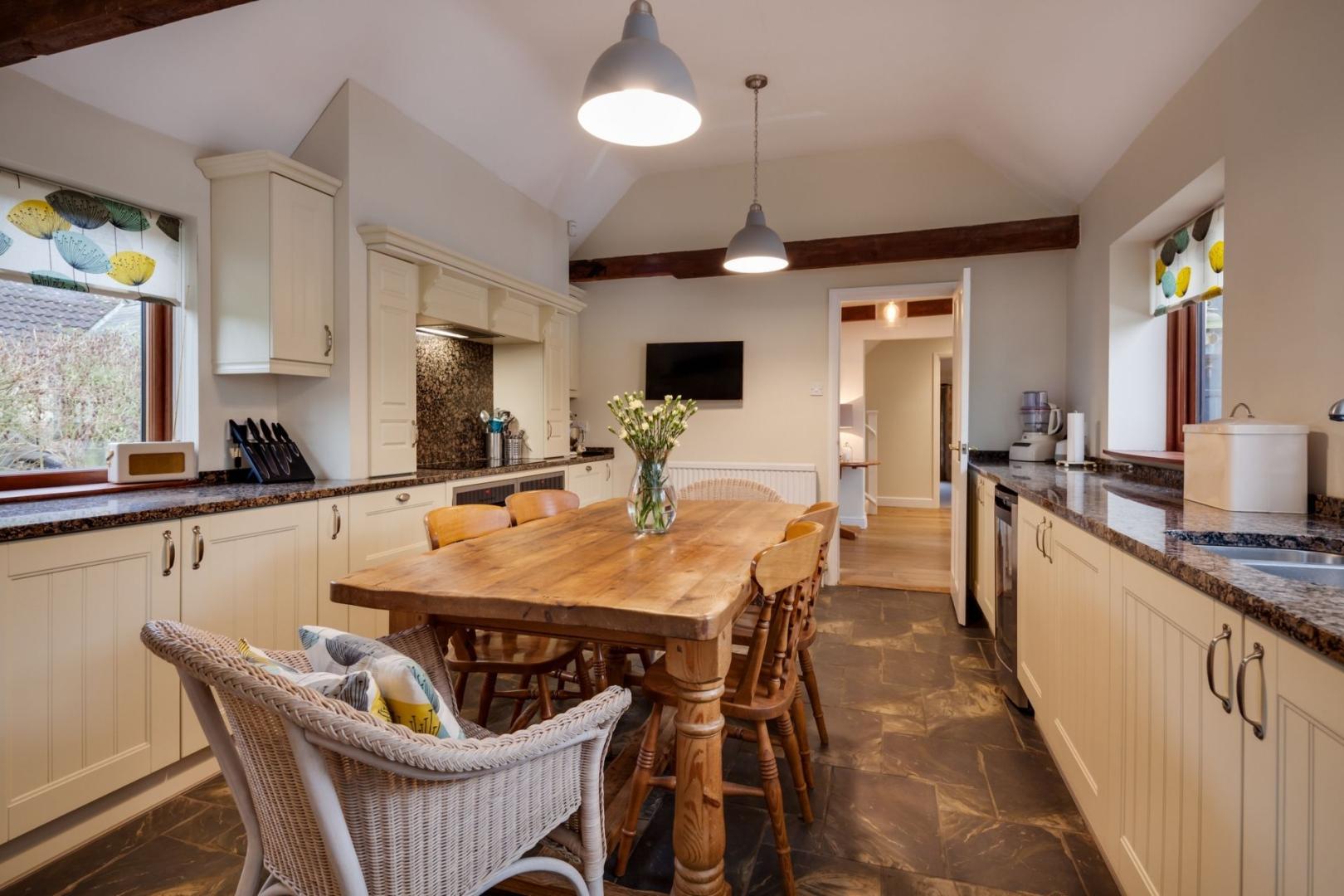

Share this with
Email
Facebook
Messenger
Twitter
Pinterest
LinkedIn
Copy this link